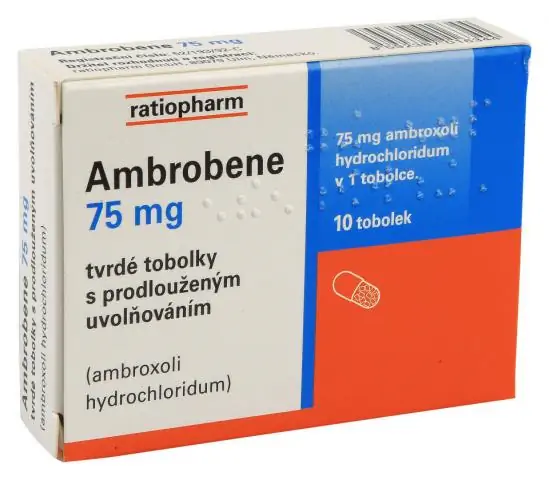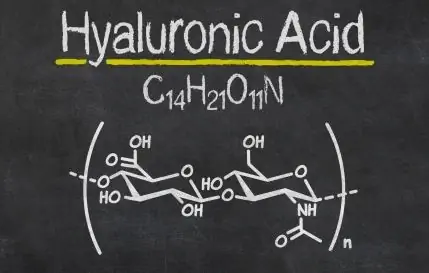- Author Rachel Wainwright wainwright@abchealthonline.com.
- Public 2023-12-15 07:39.
- Last modified 2025-11-02 20:14.
Thiamine
Thiamin: instructions for use and reviews
- 1. Release form and composition
- 2. Pharmacological properties
- 3. Indications for use
- 4. Contraindications
- 5. Method of application and dosage
- 6. Side effects
- 7. Overdose
- 8. Special instructions
- 9. Application during pregnancy and lactation
- 10. Drug interactions
- 11. Analogs
- 12. Terms and conditions of storage
- 13. Terms of dispensing from pharmacies
- 14. Reviews
- 15. Price in pharmacies
Latin name: Thiamine
ATX code: A11DA01
Active ingredient: thiamine (thiamine *)
Producer: Dalkhimfarm (Russia), Ozon LLC (Russia), Microgen NPO FGUP (NPO Virion) (Russia), Novosibkhimfarm (Russia)
Description and photo update: 2019-12-08
Prices in pharmacies: from 28 rubles.
Buy

Thiamin is a vitamin B 1.
Release form and composition
Dosage form - solution for intramuscular (i / m) administration: liquid with a transparent structure, slightly colored or colorless, with a characteristic weak odor (in ampoules: 1 ml or 2 ml - in a cardboard box 10 pcs.; in a contour cell or plastic packaging 5 or 10 pcs., in a cardboard box 1 or 2 packages; 1 ml - in a cardboard tray 5 pcs., in a cardboard box 1 or 2 trays).
1 ml of solution contains:
- active substance: thiamine hydrochloride - 25 mg or 50 mg;
- excipients: unitiol (sodium dimercaptopropanesulfonate monohydrate), water for injection.
Pharmacological properties
Pharmacodynamics
Thiamin - vitamin B 1 - is a water-soluble vitamin. It is a coenzyme of enzymes responsible for the regulation of protein and carbohydrate metabolism. Thiamine is characterized by a moderate ganglion-blocking effect and ensures the conduction of nerve impulses in synapses. It also has an antioxidant effect and increases the protection of cell membranes from the toxic effects of peroxidation products.
Pharmacokinetics
When taken orally on an empty stomach, Thiamine is almost completely absorbed from the gastrointestinal tract. Before being absorbed, it is released from the bound state by digestive enzymes. 15 minutes after taking vitamin B 1 is determined in blood plasma, and after 30 minutes - in other tissues. In the blood, its concentration remains relatively low, and in the plasma it is found mainly free thiamine, and in leukocytes and erythrocytes - its phosphorus esters.
The substance is distributed throughout all tissues: more than 50% of the injected amount is contained in the striated muscles, approximately 40% in the internal organs. There is a relative predominance of the concentration of thiamine in the liver, skeletal muscles, nervous tissue and myocardium, which is probably due to the increased consumption of the compound by these structures.
Vitamin B 1 is metabolized in the liver through phosphorylation, forming thiamine diphosphate (cocarboxylase), which has coenzyme activity and plays an important role in the participation of thiamine in fat and carbohydrate metabolism. The drug is excreted through the intestines and kidneys.
Indications for use
According to the instructions, Thiamin is indicated for vitamin B 1 deficiency and hypovitaminosis, as well as in the complex therapy of the following diseases:
- radiculitis, neuritis, neuralgia;
- paralysis, peripheral paresis;
- decrease in the secretory and motor functions of the stomach;
- peptic ulcer of the stomach and duodenum;
- atonic constipation;
- intestinal atony;
- anorexia;
- violation of the coronary circulation;
- myocardial dystrophy;
- diabetes;
- dermatoses (psoriasis, eczema, lichen planus, neurodermatitis), accompanied by neurotrophic changes and metabolic disorders.
Contraindications
Individual intolerance to the drug.
It should be used with caution in Wernicke's encephalopathy, in women in the premenopausal period and after menopause.
Instructions for the use of Thiamin: method and dosage
Thiamine solution in ampoules is intended for deep intramuscular injection.
Therapy should be started with the appointment of low doses (up to 0.5 ml of a 5% solution), then, with good tolerance, the dose is increased.
Recommended dosage:
- adults: 25-50 mg;
- children: 12.5 mg (0.5 ml of a 2.5% solution).
Frequency rate of application - 1 time per day, duration of treatment - 10-30 days.
Side effects
Against the background of the use of vitamin B 1, the appearance of increased sweating, the development of tachycardia, allergic reactions in the form of itching, urticaria, Quincke's edema, anaphylactic shock; sometimes - a feeling of soreness at the injection site.
Overdose
Cases of overdose of Thiamin solution when administered in high doses have not been described. If necessary, symptomatic treatment is prescribed.
special instructions
Parenteral administration is recommended only if there is no possibility of taking the vitamin inside: malabsorption syndrome, conditions before and after surgery, nausea, vomiting.
When using high doses of the drug, it is possible to distort the results of the spectrophotometric method for the determination of theophylline in the blood serum, laboratory studies of urine using Ehrlich's reagent for urobilinogen.
Anaphylactic reaction often develops in patients after high-dose intravenous administration.
Dextrose for Wernicke's encephalopathy should be taken before the administration of Thiamin.
Application during pregnancy and lactation
The use of the drug during pregnancy and breastfeeding is permissible.
Drug interactions
With the simultaneous parenteral use of Thiamine with pyridoxine (vitamin B 6), it becomes difficult to convert thiamine hydrochloride into a biologically active form, cyanocobalamin (vitamin B 12) - the risk of an allergic effect of the drug increases, so these combinations are not recommended.
The drug should not be mixed in the same syringe with benzylpenicillin or streptomycin (this causes the destruction of antibiotics), sulfite-containing solutions (thiamine hydrochloride completely decomposes), nicotinic acid (due to the destruction of thiamine).
When combined with phentolamine, suxamethonium iodide, propranolol, hypnotics, sympatholytics (reserpine), their pharmacological activity decreases.
Vitamin B 1 is unstable in neutral and alkaline solutions.
It is not recommended to prescribe the drug with citrates, carbonates, copper preparations, barbiturates.
Analogs
Thiamine analogs are: Thiamin-Vial, vitamin B 1, Thiamine chloride, Thiamine chloride-UVI.
Terms and conditions of storage
Keep out of the reach of children.
Store in a dark place at temperatures up to 25 ° C.
The shelf life is 3 years.
Terms of dispensing from pharmacies
Dispensed by prescription.
Reviews about Thiamin
Reviews of Thiamin vary greatly. Doctors note that the administration of the drug gives good results in the treatment of alcohol dependence, accompanied by withdrawal symptoms, neuritis, encephalopathy, as well as in the prevention of the pathogenetic effect. The advantages of Thiamin are its low cost and wide range of applications in psychology and psychiatry. However, the effect of treatment does not appear immediately: for a stable improvement in the condition, it is necessary to undergo at least 2-3 courses of therapy.
It is also possible the formation of infiltrates, especially in elderly patients, manifestations of reactions of individual intolerance and allergic responses (itching, skin rashes).
Patients note that Thiamin helps to cope with severe back pain and improves tolerance to intense physical activity, contributing to the recovery of the body after exercise. At the same time, the drug has no toxic properties, does not impair liver function and is quickly excreted from the body. It is believed that vitamin B 1 enhances immunity, but some patients claim that its administration did not affect their condition in any way.
Price for Thiamin in pharmacies
On average, the price of Thiamine in ampoules ranges from 29 to 35 rubles (for a package of 10 ampoules with a volume of 1 ml).
Thiamin: prices in online pharmacies
|
Drug name Price Pharmacy |
|
Thiamin 50 mg / ml solution for intramuscular administration 1 ml 10 pcs. 28 RUB Buy |
|
Thiamin 50 mg / ml solution for intramuscular administration 1 ml 10 pcs. RUB 30 Buy |

Maria Kulkes Medical journalist About the author
Education: First Moscow State Medical University named after I. M. Sechenov, specialty "General Medicine".
Information about the drug is generalized, provided for informational purposes only and does not replace the official instructions. Self-medication is hazardous to health!






